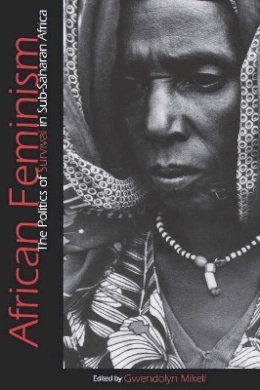11%OFF

Stock image for illustration purposes only - book cover, edition or condition may vary.
African Feminism
Gwendolyn Mikell
€ 37.99
€ 33.95
FREE Delivery in Ireland
Description for African Feminism
Paperback. Demonstrates the Western forms of feminism with which we have become familiar since the 1960s. This book presents case studies of ten African states, demonstrating that African women are creating a powerful and specifically African feminism. Editor(s): Mikell, Gwendolyn. Num Pages: 392 pages, 2 illus. BIC Classification: 1H; JFFK. Category: (U) Tertiary Education (US: College). Dimension: 235 x 155 x 19. Weight in Grams: 566.
African feminism, this landmark volume demonstrates, differs radically from the Western forms of feminism with which we have become familiar since the 1960s. African feminists are not, by and large, concerned with issues such as female control over reproduction or variation and choice within human sexuality, nor with debates about essentialism, the female body, or the discourse of patriarchy. The feminism that is slowly emerging in Africa is distinctly heterosexual, pronatal, and concerned with "bread, butter, and power" issues.
Contributors present case studies of ten African states, demonstrating that—as they fight for access to land, for the right to own ... Read more
Show LessProduct Details
Format
Paperback
Publication date
1997
Publisher
University of Pennsylvania Press United States
Number of pages
392
Condition
New
Number of Pages
392
Place of Publication
Pennsylvania, United States
ISBN
9780812215809
SKU
V9780812215809
Shipping Time
Usually ships in 7 to 11 working days
Ref
99-1
About Gwendolyn Mikell
Contributors include Tsehai Berhane-Selassie, Carlene H. Dei, Shawn Riva Donaldson, Ilsa M. Glazer, Enid Gort, Betty J. Harris, Dolores Koenig, Takyiwaa Manuh, Gwendolyn Mikell, Maria Nzomo, Brooke Grundfest Schoepf, D. J. Shehu, and Jeanne Maddox Toungara. Gwendolyn Mikell is Professor of Anthropology at Georgetown University.
Reviews for African Feminism
"This book is the best thing I've seen on the question—not only of 'feminism' in its African articulation but also, more generally, on the question of how feminism emerges and what it means to those who espouse it."—Joan Scott, Institute for Advanced Study, Princeton
